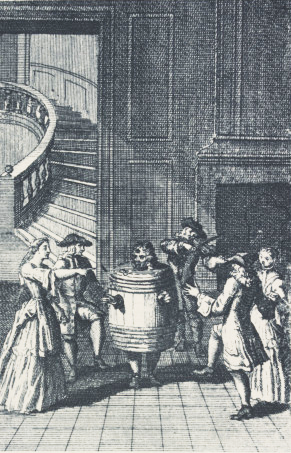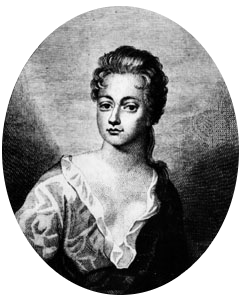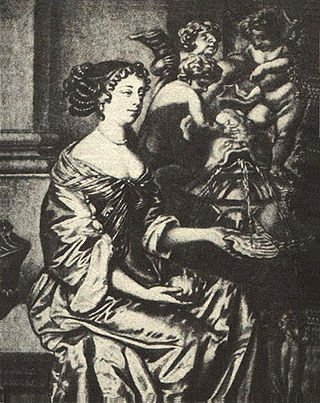Related Research Articles

Aphra Behn was an English playwright, poet, prose writer and translator from the Restoration era. As one of the first English women to earn her living by her writing, she broke cultural barriers and served as a literary role model for later generations of women authors. Rising from obscurity, she came to the notice of Charles II, who employed her as a spy in Antwerp. Upon her return to London and a probable brief stay in debtors' prison, she began writing for the stage. She belonged to a coterie of poets and famous libertines such as John Wilmot, Lord Rochester. Behn wrote under the pastoral pseudonym Astrea. During the turbulent political times of the Exclusion Crisis, she wrote an epilogue and prologue that brought her legal trouble; she thereafter devoted most of her writing to prose genres and translations. A staunch supporter of the Stuart line, Behn declined an invitation from Bishop Burnet to write a welcoming poem to the new king William III. She died shortly after.

"Restoration comedy" is English comedy written and performed in the Restoration period of 1660–1710. Comedy of manners is used as a synonym for this. After public stage performances were banned for 18 years by the Puritan regime, reopening of the theatres in 1660 marked a renaissance of English drama. Sexually explicit language was encouraged by King Charles II (1660–1685) personally and by the rakish style of his court. Historian George Norman Clark argues:
The best-known fact about the Restoration drama is that it is immoral. The dramatists did not criticize the accepted morality about gambling, drink, love, and pleasure generally, or try, like the dramatists of our own time, to work out their own view of character and conduct. What they did was, according to their respective inclinations, to mock at all restraints. Some were gross, others delicately improper.... The dramatists did not merely say anything they liked: they also intended to glory in it and to shock those who did not like it.
This article contains information about the literary events and publications of 1696.

The City-Heiress, or, Sir Timothy Treat-all is a play by Aphra Behn first performed in 1682. The play, a Restoration comedy, reflects Behn's own highly Royalist political point of view.

Oroonoko: or, the Royal Slave is a work of prose fiction by Aphra Behn (1640–1689), published in 1688 by William Canning and reissued with two other fictions later that year. It was also adapted into a play. The eponymous hero is an African prince from Coramantien who is tricked into slavery and sold to European colonists in Surinam where he meets the narrator. Behn's text is a first-person account of Oroonoko's life, love, rebellion, and execution.

Anne Bracegirdle was an English actress.

Mary Saunderson (1637–1712), later known as Mary Saunderson Betterton after her marriage to Thomas Betterton, was an actress and singer in England during the 1660s and 1690s. She is considered one of the first English actresses.
Abdelazer; or, The Moor's Revenge is a 1676 play by Aphra Behn, an adaptation of the c. 1600 tragedy Lust's Dominion. It is Behn's only tragic play.
Samuel Sandford was an English character actor, known for his roles as villains.
The Forc'd Marriage; or, The Jealous Bridegroom is a play by Aphra Behn, staged by the Duke's Company on 20 September 1670 in Lincoln's Inn Fields, London, England. This sex tragicomedy ran for six nights, which granted Behn the house profits for both the third and six nights. It is considered her first staged play. Thomas Otway played a "probation part."
The Younger Brother, or, The Amorous Jilt is a comedy written by Aphra Behn. The play was first performed and published posthumously in 1696, but was probably written in the late 1680s.
The False Count, Or, A New Way to play An Old Game, is a comedic play written by Aphra Behn, first performed in 1681 and published in 1682. It was staged by the Duke's Company at the Dorset Garden Theatre in London. The cast included William Smith as Don Carlos, James Nokes as Francisco, John Freeman as Sebastian, John Wiltshire as Antonio, George Bright as Baltazer, Cave Underhill as Guzman, Anthony Leigh as Guilion, Elizabeth Currer as Isabella and Margaret Osborne as Jacinta.

Sir Patient Fancy: A Comedy, is a comedic play written by Aphra Behn, first performed in 1678. It is Behn's first overtly political play. It was staged by the Duke's Company at the Dorset Garden Theatre in London with a cast that included Nell Gwyn as Lady Knowell, Anthony Leigh as Sir Patient Fancy, John Crosby as Leander Fancy, Thomas Betterton as Wittmore, William Smith as Lodwick Knowell, James Nokes as Sir Credulous Easy, John Richards as Curry, Elizabeth Currer as Lady Fancy, Mary Betterton as Isabella, Emily Price as Lucretia and Anne Shadwell as Maundy.
John Bowman (1651–1739) was a British stage actor. He began his career in the Duke's Company at the Dorset Garden Theatre. In 1692 he married Elizabeth Watson, who acted under the name Elizabeth Bowman. He later switched to act at the Drury Lane Theatre. He is also referred to as John Boman.
William Bowen (1666–1718) was a British stage actor. He was part of the United Company from 1689. For a time, he became known for his comic roles. He was fatally wounded in a duel with fellow actor James Quin in 1718.
Joseph Williams was an English stage actor of the seventeenth and early eighteenth century.
Elizabeth Currer was an Irish stage actress of the Restoration Era. She was a member of the Duke's Company during the 1670s and subsequently part of the merged United Company from 1682. Although she was likely acting in London several years earlier than this, her first known role was in The Conquest of China in 1675. Due to the irregular spelling of the time her surname is sometimes written as Carrier, Corer and Currier amongst other variants.
Joseph Harris (c.1650–1715) was an English stage actor and playwright. His earliest known performance was in the United Company's The Bloody Brother in 1685. Earlier mentions an actor named Harris are likely to refer to an earlier lesser-known actor William Harris or even the celebrated Restoration performer Henry Harris. He remained with the United Company until 1695 when he joined Thomas Betterton's breakaway company at the Lincoln's Inn Fields Theatre. He acted there until around 1705, although some reports have him still acting as late as 1715.
Emily Price was an English stage actress of the seventeenth century. She was a member of the Duke's Company between 1676 and 1682, acting at the Dorset Garden Theatre in London and then joined the merged United Company. She was a friend of the playwright Aphra Behn and appeared in several of her plays. She was billed as Mrs Price.
Charlotte Butler was an English stage actress and singer of the seventeenth century. She may have joined the Duke's Company in the 1670s, but her first definite recorded performance was in Aphra Behn's The Revenge (1680) The anonymous A Satyr on The Players describes her,
References
- ↑ "The widdow Ranter, or, The history of Bacon in Virginia a tragi-comedy, acted by Their Majesties servants / written by Mrs. A. Behn". quod.lib.umich.edu. Retrieved 22 December 2021.
- 1 2 Paul Salzman, David McInnis. "Virginian Culture and Experimental Genre in Aphra Behn's The Widow Ranter". Early Modern Englishwomen Testing Ideas. ISBN 9781317147015. OCLC 1025308980.
- ↑ Jehlen, Myra. (2013). The English Literatures of America : 1500-1800. Taylor and Francis. p. 233. ISBN 9781317795414. OCLC 866858411.
- ↑ BEVIS, RICHARD W. (2016). ENGLISH DRAMA : restoration and eighteenth century 1660-1789. ROUTLEDGE. p. 147. ISBN 978-1138149557. OCLC 958783382.
- 1 2 Korte, Barbara (1 September 2015). "Aphra Behn's The Widow Ranter: Theatrical Heroics in a Strange New World". Anglia. 133 (3). doi:10.1515/ang-2015-0040. ISSN 1865-8938. S2CID 165131380.
- ↑ Van Lennep, W. The London Stage, 1660-1800: Volume One, 1660-1700. Southern Illinois University Press, 1960. p.377
